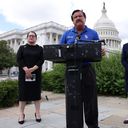Nation's oldest Latino civil rights group eyes revamp with next generation of members

The League of United Latin American Citizens, the nation's oldest Latino civil rights group, isn't getting any younger — but the people it represents are, a reality that's quickly reshaping its focus.
Why it matters: LULAC's median membership age is 66 and its meetings still open with the Pledge of Allegiance and a prayer. But the median age of today's U.S. Latino population is 19.
- Many Latino Gen Z and Millennials are more likely than their parents and grandparents to identify with multiethnic coalitions fighting systemic racism.
- Latinos' political influence is growing. The U.S. Hispanic population, now 61 million, could nearly double in the next four decades.
- These factors are helping to drive the evolution of an organization that was founded in Texas in 1929 by Hispanic veterans of World War I, and whose early initiatives focused on court fights over desegregation, education, and minimum wage protections.
Driving the news: Today, Domingo Garcia, LULAC's national president since 2018, is speaking out against anti-Asian American violence, standing with the Black Lives Matter movement, and supporting Native American activists seeking the removal of public monuments to Spanish conquistadors.
- He's encouraging the creation of LGBTQIA councils and pushing his group to open student councils on community college campuses.
- LULAC also is active in opposing voter suppression proposals in Texas, Georgia, and Arizona.
- He's seeking to attract younger members as the group's Mexican-American Baby Boomer base ages.
What they're saying: "This is not your grandfather's civil rights organization anymore," Garcia tells Axios.
- "We have to make these changes to survive and continue to fight for our communities," he said. "The nation's changing. We have to, too."
- The organization reports about 132,000 members across 50 states and Puerto Rico and says it's grown by about 15,000 over the last 15 years.
Between the lines: LULAC's national board and its local councils across the U.S. are still led by Baby Boomers who kept the organization alive through membership declines in the 1980s.
- Women have gradually taken on more leadership in the organization, after some councils blocked women from being members as late as the 1990s.
- The organization has become increasingly outspoken on immigrant rights.
What we're watching: Can a modernizing LULAC expand its core beyond a base in Texas and the American Southwest base and attract more Puerto Rican and Central American leadership?
This story first appeared in the new Axios Latino newsletter. Sign up here.